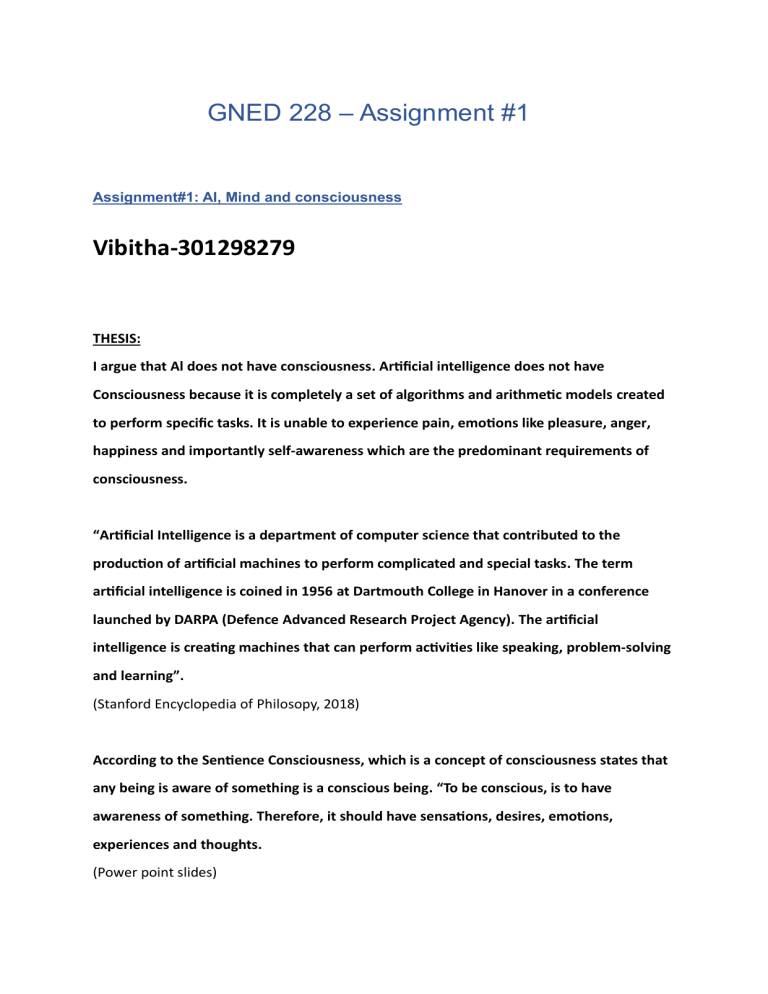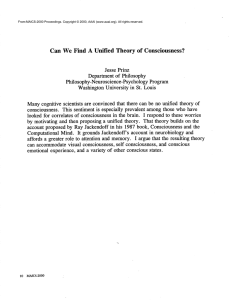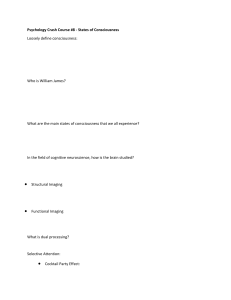
GNED 228 – Assignment #1 Assignment#1: AI, Mind and consciousness Vibitha-301298279 THESIS: I argue that Al does not have consciousness. Artificial intelligence does not have Consciousness because it is completely a set of algorithms and arithmetic models created to perform specific tasks. It is unable to experience pain, emotions like pleasure, anger, happiness and importantly self-awareness which are the predominant requirements of consciousness. “Artificial Intelligence is a department of computer science that contributed to the production of artificial machines to perform complicated and special tasks. The term artificial intelligence is coined in 1956 at Dartmouth College in Hanover in a conference launched by DARPA (Defence Advanced Research Project Agency). The artificial intelligence is creating machines that can perform activities like speaking, problem-solving and learning”. (Stanford Encyclopedia of Philosopy, 2018) According to the Sentience Consciousness, which is a concept of consciousness states that any being is aware of something is a conscious being. “To be conscious, is to have awareness of something. Therefore, it should have sensations, desires, emotions, experiences and thoughts. (Power point slides) COISCIOUSNESS AND MIND: Consciousness is defined as the quality of awareness or the subjective awareness of being aware of the things happening in the environment. The fundament to have mind is having awareness. A creature has a mind if and only if it has consciousness. “Being subject of conscious state” states that a being is a conscious creature if it has the mental state of which it is aware. It means that awareness of being aware. According to “Thomas Nagel’s” (1974) having a subjective point of view briefs that the conscious being must have a subjective and analytical thinking about the world from its mental or experiential perspective. This is a proper definition of mind based on consciousness because it includes one of the three notations of consciousness which is having a subjective point of view. (Power point slides) PRO ARGUMENT: Consciousness is an action that originates from the action of the brain. All AI systems depends on the algorithms and the input data to perform tasks. They do not have the ability and potential to do something creatively like human beings. So, it is undoubtedly a medium created by humans to perform complicated and special tasks rather than a conscious body with emotions and sensibility. “The argument from Consciousness” states that a machines are incapable of experiencing conscious activities like happiness, anger, sadness, guilt, stress and depression. According to “Alan Turing”(1950) the above-mentioned subjective states are unique to living beings and cannot be performed by machines because it lacks the predominant capacity for consciousness. “The Critics of Embodied Intelligence” indubitably proposed that the intelligence is progressed through complicated interactions between individual humans and their social and physical environment. This perspective states that human perception is not wholly determined by natural factors, but instead framed by a variety of environmental factors such as culture, social discussions and physical experiences. Accordingly, intelligence is solely not a outcome of genetic or biological factors, but it is influenced by a wide range of environmental inputs. (Power point slides) CON ARGUMENT: In Accordance with the report of a competition held in 2014 the computer program “Eugene Goostman” satisfy 33% of judges in the Turing Test Competition that it was a Human. The Turing Test created by Alan Turing is a estimate of machine’s ability to Express intelligent behaviour identical from that of a human being. However, it must be noted that passing the Turing Test does not necessarily imply that a Machine has achieved real human-like intelligence or consciousness, as the test initially measures the machine’s capability to produce exactly human-like reply in a specific content. Dowe D. (2016). The Turing test In Stanford Encyclopedia of philosophy The Theological Objection : The Theological Objection points that the potentiality for thought is not a function of the Material body, but rather of an immortal soul that is unique to humans and not present in other creatures. Therefore, the argument concludes that material body like machines, lacking an immortal soul, are incapable of genuine thought. So Artificial Intelligence does not have consciousness. (Power point slides)




